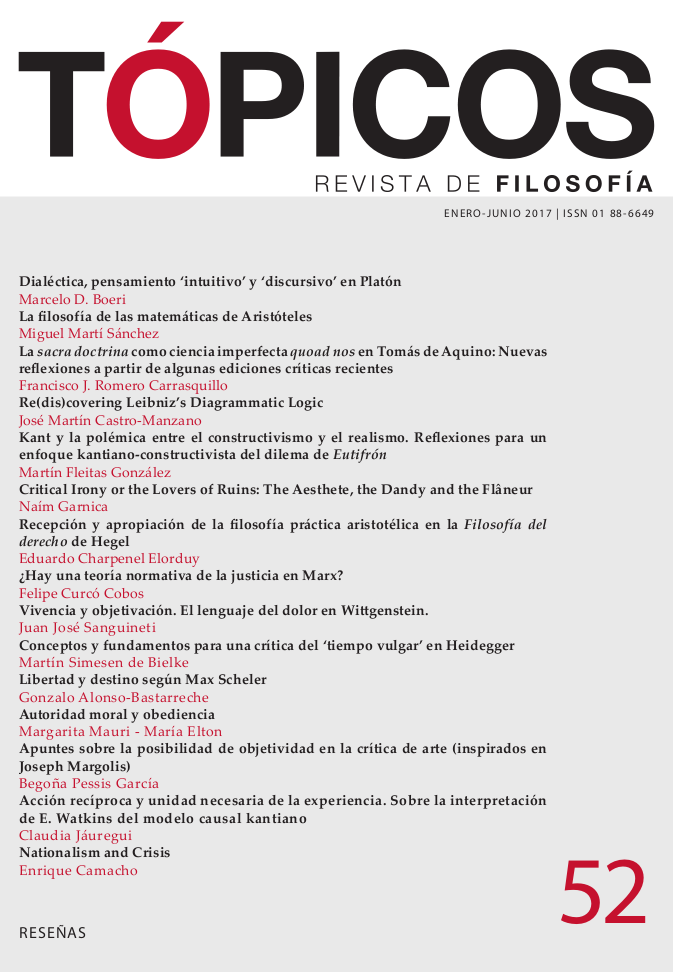Publicado 2016-12-27
Palabras clave
- Tomás de Aquino,
- obediencia,
- autoridad,
- autogobierno,
- autonomía moral
Cómo citar
Resumen
El concepto de autonomía moral ilustrado, que persiste en nuestros días, ha considerado a la obediencia como una conducta ciega e irracional, olvidando el carácter virtuoso que tuvo en el pensamiento de Tomás de Aquino, que asume el de Aristóteles. En este artículo se discute esa concepción ilustrada, demostrando el carácter racional de dicha virtud, que ha sido a rmado por destacados autores contemporáneos, tales como Gadamer, Weil y Bochenski, como también por aquellos que en nuestra época reconocen la necesidad del binomio autoridad– obediencia para el desarrollo del autogobierno de la persona, tales como MacIntyre, o por Murdoch quien se re ere a las virtudes que lo facilitan.
Referencias
- Abbà, G. (1992). Felicidad, vida buena y virtud. Barcelona: Eunsa.
- Aquino, Tomás de. (2001). Comentario a la “Ética a Nicómaco”. Mallea, A. M. (trad.) Pamplona: Eunsa.
- ____(1998). De Veritate. Pamplona: Servicio de Publicaciones de la Universidad de Navarra.
- ____(1988-94). Suma de Teología. Madrid: Bibioteca de Autores Cristianos.
- Aristóteles. (1981). Ética Nicomaquea. Araujo, M. y Marías, J.(trad.) Madrid: Centro de Estudios Constitucionales.
- Berman, H.J. (2003). Law and Revolution. Vol. II. Cambridge: Harvard University Press.
- Bochenski, J.M. (1979). ¿Qué es autoridad? Barcelona: Herder.
- Gadamer, H. G. (1994). Verdad y método. Agut, A. y Agapito, R. (trad.) Salamanca: Sígueme.
- Kant, I. (1981). Crítica de la razón práctica. Miñana y Villagresa, E. y García Morente, M. (trad.) Madrid: Espasa–Calpe.
- Labourdette, M.M. (1957). La vertu d’obeissance selon st. Thomas. En Revue Thomiste, 57, 4, pp. 626-656.
- Lutero, M. (2012). Martin Luther’s Basic Theological Writings. Full, T. F. y Russelll, W. R. (eds.) Minneapolis: Fortress Press.
- MacIntyre, A. (2001). Animales racionales y dependientes: por qué los seres humanos necesitamos las virtudes. Barcelona: Paidós.
- ____(1992). Tres versiones rivales de la Ética. Rovira, R. (trad.) Madrid: Rialp.
- ____(1991). How To Seem Virtuous Without Actually Being So. En Centre for the Study of Cultural Values. Occasional Papers Series No 1. Lancaster University.
- ____(1981). Tras la virtud. Barcelona: Editorial Crítica.
- Melanchton, P. (1992). Loci Communes. Saint Louis: Concordia Publishing House.
- Murdoch, I. (2001). La soberanía del bien. Domínguez Hernández, A. (trad.) Madrid: Caparrós Editores.
- Popper, K. (1992). La sociedad abierta y sus enemigos. Barcelona: Paidós, 2a reimpr.
- Rhonheimer, M. (2000). Ley natural y razón práctica. Pamplona: Eunsa.
- Schneewind, J B. (2005). The Invention of Autonomy. Cambridge: University Press.
- Svensson, M. (2008). Phillip Melanchton and the Reception of Aristotelian Natural Law Theory in the European Reformation. En García Martínez A. N. et. al. (eds.) Natural Law. Historical, Systematic and Juridical Approaches. (109-126). Newcastle: Cambridge Scholar Publishing.
- Weil, S. (1996). Echar raíces. González, J. C. (Trad.) Madrid: Trotta.
- Wojtyla, K. (1997). Mi visión del hombre. Madrid: Palabra.






